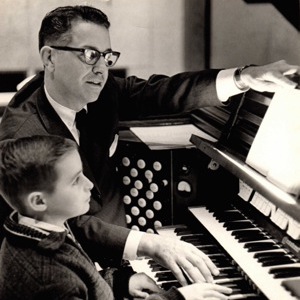 BELIEVE that Dr. Theodore Marier is even today the most important liturgical musician in the English Speaking world, despite a life in relative obscurity and service. Few know his name. Yet, his influence and importance certainly surpass postconciliar giants like Richard Proulx and Alexander Peloquin, whose work live on today. And his liturgical works are in greater demand today than when they were composed. My assertion specifies the parameter “most important liturgical musician”—one who worked in a parish with parish choirs in addition to being a composer, scholar, and editor of hymnals. Certainly, Pope Saint Pius X is the most important figure in liturgical music of the Twentieth and Twenty-first Centuries; he is referred to by name twice in SACROSANCTUM CONCILIUM for having “explained more precisely the ministerial function supplied by sacred music in the service of the Lord.” (S. C. §42). Pope Benedict XVI certainly looms as a most prominent figure in the Twenty-first Century. But a liturgical musician working in the trenches to implement Vatican II? Undoubtedly Theodore Marier.
BELIEVE that Dr. Theodore Marier is even today the most important liturgical musician in the English Speaking world, despite a life in relative obscurity and service. Few know his name. Yet, his influence and importance certainly surpass postconciliar giants like Richard Proulx and Alexander Peloquin, whose work live on today. And his liturgical works are in greater demand today than when they were composed. My assertion specifies the parameter “most important liturgical musician”—one who worked in a parish with parish choirs in addition to being a composer, scholar, and editor of hymnals. Certainly, Pope Saint Pius X is the most important figure in liturgical music of the Twentieth and Twenty-first Centuries; he is referred to by name twice in SACROSANCTUM CONCILIUM for having “explained more precisely the ministerial function supplied by sacred music in the service of the Lord.” (S. C. §42). Pope Benedict XVI certainly looms as a most prominent figure in the Twenty-first Century. But a liturgical musician working in the trenches to implement Vatican II? Undoubtedly Theodore Marier.
My Presentation • The following presentation was given at the Sacred Music Symposium in California. It was the closing event of a glorious week of sacred music and prayer.

 EW KNOW Marier’s work. He was not an international figure as a composer of concert works, although he traveled in circles that included Olivier Messiaen, Jean Langlais, Dom Joseph Gajard of the Solesmes Abbey, Seizi Ozawa, Kurt Masur, and others. His liturgical compositions, influence, and guidance throughout the Twentieth Century and the Conciliar changes are exceedingly important today in the Twenty-first Century especially in light of Pope Francis’ motu proprio, “Traditionis custodes.” Regardless, his influence stands on its own. Marier is best known as the founder of the Saint Paul’s Choir School (Archdiocesan Choir School) in Cambridge, Massachusetts and as the editor of the landmark hymnal, “Hymns Psalms and Spiritual Canticles” (1974, 1983) which modeled the sung Mass in the brand new Novus Ordo. His Psalter will be that hymnal’s most lasting contribution. (Listen here to the Boston Cathedral Choir sing Marier’s Psalm 128.) The founding of the school in 1963 (an extraordinary year in the Church!) was to him the natural conclusion of the liturgical documents put forth by Popes Pius X, Pius XI, and Pius XII, and ultimately Vatican II. He took these liturgical directives to heart and acted upon them. He demanded excellence not only from his students, but from the institution he founded.
EW KNOW Marier’s work. He was not an international figure as a composer of concert works, although he traveled in circles that included Olivier Messiaen, Jean Langlais, Dom Joseph Gajard of the Solesmes Abbey, Seizi Ozawa, Kurt Masur, and others. His liturgical compositions, influence, and guidance throughout the Twentieth Century and the Conciliar changes are exceedingly important today in the Twenty-first Century especially in light of Pope Francis’ motu proprio, “Traditionis custodes.” Regardless, his influence stands on its own. Marier is best known as the founder of the Saint Paul’s Choir School (Archdiocesan Choir School) in Cambridge, Massachusetts and as the editor of the landmark hymnal, “Hymns Psalms and Spiritual Canticles” (1974, 1983) which modeled the sung Mass in the brand new Novus Ordo. His Psalter will be that hymnal’s most lasting contribution. (Listen here to the Boston Cathedral Choir sing Marier’s Psalm 128.) The founding of the school in 1963 (an extraordinary year in the Church!) was to him the natural conclusion of the liturgical documents put forth by Popes Pius X, Pius XI, and Pius XII, and ultimately Vatican II. He took these liturgical directives to heart and acted upon them. He demanded excellence not only from his students, but from the institution he founded.
Marier’s Qualities • His postconciliar liturgical compositions addressed the desperate need for sacred music in the vernacular that was required overnight. His compositions were deeply steeped in Gregorian Chant and demonstrate the continuity of the old rite and the new in a manner that was not only accessible, but beautiful, sacred, and universal. He was the model of a servant leader and servant composer. He spent his life building bridges. He began preparing those bridges in the 1940s with longtime Saint Paul’s pastor, Msgr. Augustine Hickey long before Vatican II. He built bridges during Vatican II (listen here to his “Lux Aeterna” in English recorded in 1965!) and in the years after Vatican II until his death in 2001. He always built a bridge out of love for God and the faithful. He was a man of deep faith, a loving husband, father, and family man. All of this made him a better liturgical musician.
![]()
Personal Takeaway:
I never met Theodore Marier. I did not grow up in New England. However, I have met countless souls whose lives have been changed forever by him. For someone I never met, he has had the most profound influence on my career. Whether one uses his compositions or not—they will have to stand on their own merits—I have one final personal conclusion: The more I learn about Marier, his life and career, the more I am inspired to be a better human being.
![]()
Acknowledgments:
This presentation is just a small offering, giving an overview which I hope others can build upon. I wish to extend profuse thanks to Dr. William H. Atwood, Diocesan Director of Music for the Diocese of Bridgeport Connecticut for his dissertation The Influence of Plainchant on the liturgical Music of Theodore Marier. I also wish to thank William Endicott, Class of 2008, for his thesis, “Repleatur Os Meum Laude Tua, A History of the Music and Mission of the St. Paul’s Choir School” and for supplying recordings and scores. I also wish to thank Br. Paul J. Murray, Class of 1996, for his tireless editorial work on Marier’s compositions. Finally, I wish to thank the late John Dunn (1943-2022), Headmaster & Director of Music Emeritus, Saint Paul’s Choir School for his painstaking editorial updates of Marier’s psalter—a true labor of love—and generous sharing of institutional knowledge.
Soli Deo gloria
Oremus pro invicem.
Let us pray for each other.
![]()
